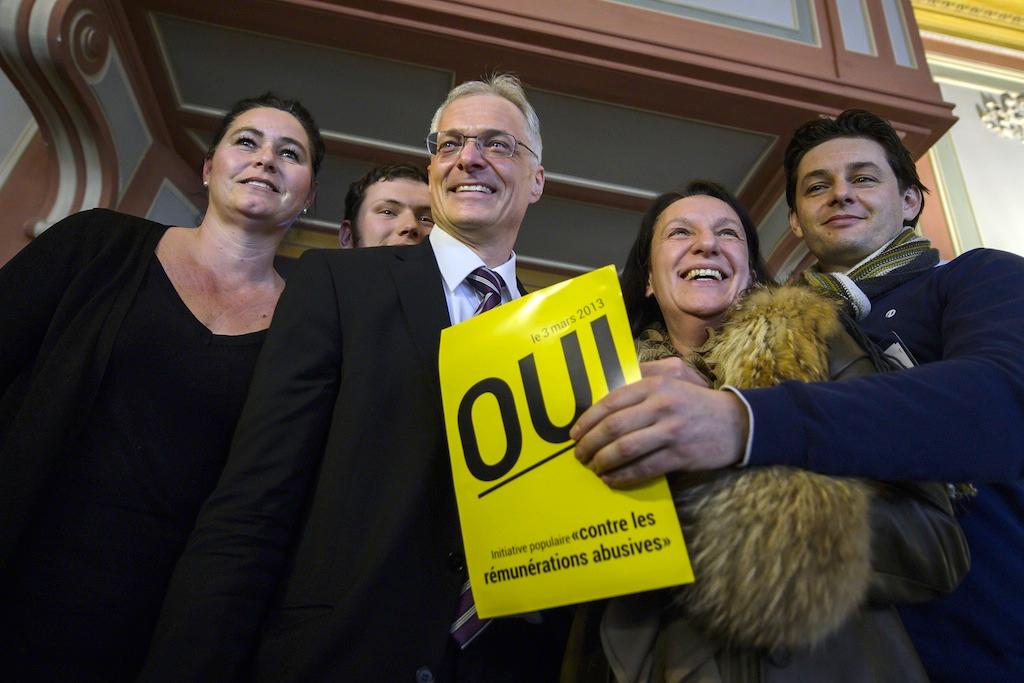Swiss approve tough rules on executive salary
Swiss businessman and senator Thomas Minder (3rdR) poses on March 3, 2013 with members of the support committee behind a poster reading ‘Yes’ in French while waiting for the result of a nationwide vote in Schaffhausen. Switzerland took part in a popular vote on whether to rein in executive pay and force business leaders to give up departure compensation known as golden parachutes.
Swiss voters on Sunday approved what has been dubbed the toughest executive pay rules in the world.
Sixty-eight percent of voters were in favor of forcing Swiss companies to give shareholders sweeping powers in deciding on executive pay. The proposal also bans golden handshakes, golden parachutes and signing bonuses. If managers don't abide by these rules, they may face up to three years in prison.
The vote reflects growing anger over excessive bonuses and executive pay, given that Switzerland's CEOs and chairmen are among the highest paid in the world. Many argued that the recent public outcry over Novartis' Chairman's golden handshake worth 72 million francs ($76 million) has fueled the frustration further, leading to one of the highest approvals in a referendum vote in Swiss history.
The so-called "rip-off" initiative has polarized Switzerland, which has long been a bastion of high pay and lucrative bonuses. Thomas Minder, a politician and businessman from the north of Switzerland, is the mastermind behind the initiative and has lobbied for a referendum for more than four years.
Pro-business lobbies like Economiesuisse had warned that a positive outcome would hit Switzerland's competitiveness, as multinational firms may opt for other locations as a place to do business.
Are these concerns justified?
Justin Szwaja, senior manager of human capital, performance and reward at Ernst & Young in Geneva told CNBC.com that "in terms of the attractiveness for employers, the opportunities in Switzerland shouldn't change. The country will likely remain as attractive, as far as resources, its location in the center of Europe and the skillset it has to offer."
(Read More: Bankers Can Easily Avoid the EU Bonus Cap)
For employees concerned about executive pay, Szwaja says the proposals should not be problematic for high performing companies. Executives should still expect pay levels commensurate with their skillset and as a result, he sees no mass exodus of key talent out of Switzerland. "That said, this will be a very difficult piece of legislation to enact and there will be some challenging discussions ahead on how to get the right balance of stricter governance and practical implementation that is fair for all stakeholders."
In a similar vein, David Costa, dean of the Robert Kennedy College told CNBC: "Switzerland will continue to be highly competitive for several reasons. First the [World Economic Forum] competitiveness survey, topped by Switzerland in the last few years, does not consider executive pay as a criteria. Secondly, for executives, Switzerland remains a highly competitive place to work due to the low taxation (30 percent on average vs. 48 percent for Germany and 45 percent for England) and very high quality of life."
(Read More: Switzerland, US Sign Pact to Crack Down on Tax Evasion)
Economiesuisse, Switzerland's biggest business lobby, wrote in a statement: "Economiesuisse regrets the Yes on the Minder initiative, but respects the will of the people. The outcome is a clear vote for the strengthening of shareholder rights to limit excessive pay. (…) It is now important to ensure a practical implementation of the proposals."
Szwaja adds that the most immediate implication for Swiss companies will be "to analyze the gaps and synergies of current practice with the Minder Initiative, a review of compensation practices on a more regular basis, well communicated disclosure to shareholders and greater transparency."
Is the Swiss vote an example for the rest of Europe?
Robert Kennedy College's Costa told CNBC: "The recent EU decision to cap banking bonuses to one year's base salary is another signal that this reform might be adopted by other European countries too (Denmark and the Netherlands already have a binding shareholder vote on executives compensation)."
However, Ernst & Young's Szwaja told CNBC "that a lot of other EU countries have already implemented stricter governance practices, and Switzerland is essentially catching up."
(Read More: Boris Johnson: Bank Bonus Caps 'Deluded Measure')
Still, Szwaja says he cannot rule out that other European countries will follow suit and try to propose even stricter laws, "but they may wait to see the Swiss solution being implemented first."
Even though Swiss voters gave an overwhelming nod of approval to stricter pay rules, there is considerable doubt over when the pay proposals will be implemented into law and whether they will be "watered down". The proposals will now be sent to the Swiss government which will be tasked with drawing up legislation. The new law may go into effect as early as 2014.
More from our partners, CNBC:
CNBC: Buffett still buying stocks, sees 'good value'
CNBC: US oil and gas boom takes many by surprise
CNBC: Maersk warns of over-capacity risk in 2013
Every day, reporters and producers at The World are hard at work bringing you human-centered news from across the globe. But we can’t do it without you. We need your support to ensure we can continue this work for another year.
Make a gift today, and you’ll help us unlock a matching gift of $67,000!
